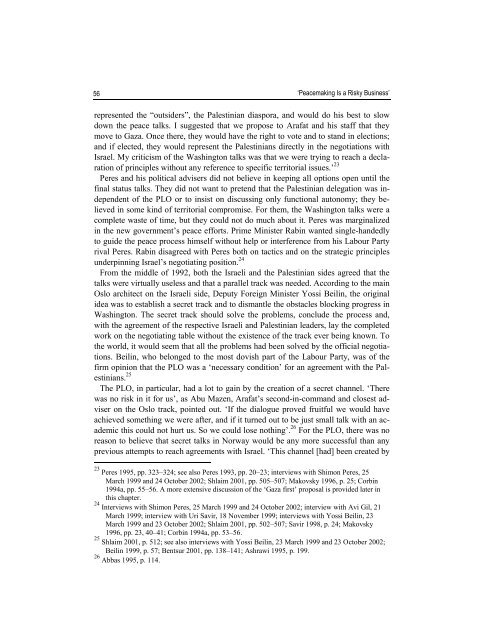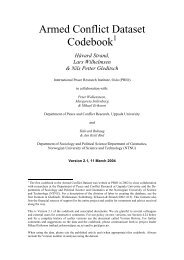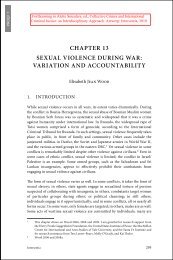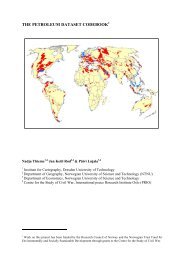Peacemaking Is a Risky Business - PRIO
Peacemaking Is a Risky Business - PRIO
Peacemaking Is a Risky Business - PRIO
Create successful ePaper yourself
Turn your PDF publications into a flip-book with our unique Google optimized e-Paper software.
56 ‘<strong>Peacemaking</strong> <strong>Is</strong> a <strong>Risky</strong> <strong>Business</strong>’represented the “outsiders”, the Palestinian diaspora, and would do his best to slowdown the peace talks. I suggested that we propose to Arafat and his staff that theymove to Gaza. Once there, they would have the right to vote and to stand in elections;and if elected, they would represent the Palestinians directly in the negotiations with<strong>Is</strong>rael. My criticism of the Washington talks was that we were trying to reach a declarationof principles without any reference to specific territorial issues.’ 23Peres and his political advisers did not believe in keeping all options open until thefinal status talks. They did not want to pretend that the Palestinian delegation was independentof the PLO or to insist on discussing only functional autonomy; they believedin some kind of territorial compromise. For them, the Washington talks were acomplete waste of time, but they could not do much about it. Peres was marginalizedin the new government’s peace efforts. Prime Minister Rabin wanted single-handedlyto guide the peace process himself without help or interference from his Labour Partyrival Peres. Rabin disagreed with Peres both on tactics and on the strategic principlesunderpinning <strong>Is</strong>rael’s negotiating position. 24From the middle of 1992, both the <strong>Is</strong>raeli and the Palestinian sides agreed that thetalks were virtually useless and that a parallel track was needed. According to the mainOslo architect on the <strong>Is</strong>raeli side, Deputy Foreign Minister Yossi Beilin, the originalidea was to establish a secret track and to dismantle the obstacles blocking progress inWashington. The secret track should solve the problems, conclude the process and,with the agreement of the respective <strong>Is</strong>raeli and Palestinian leaders, lay the completedwork on the negotiating table without the existence of the track ever being known. Tothe world, it would seem that all the problems had been solved by the official negotiations.Beilin, who belonged to the most dovish part of the Labour Party, was of thefirm opinion that the PLO was a ‘necessary condition’ for an agreement with the Palestinians.25The PLO, in particular, had a lot to gain by the creation of a secret channel. ‘Therewas no risk in it for us’, as Abu Mazen, Arafat’s second-in-command and closest adviseron the Oslo track, pointed out. ‘If the dialogue proved fruitful we would haveachieved something we were after, and if it turned out to be just small talk with an academicthis could not hurt us. So we could lose nothing’. 26 For the PLO, there was noreason to believe that secret talks in Norway would be any more successful than anyprevious attempts to reach agreements with <strong>Is</strong>rael. ‘This channel [had] been created by23 Peres 1995, pp. 323–324; see also Peres 1993, pp. 20–23; interviews with Shimon Peres, 25March 1999 and 24 October 2002; Shlaim 2001, pp. 505–507; Makovsky 1996, p. 25; Corbin1994a, pp. 55–56. A more extensive discussion of the ‘Gaza first’ proposal is provided later inthis chapter.24 Interviews with Shimon Peres, 25 March 1999 and 24 October 2002; interview with Avi Gil, 21March 1999; interview with Uri Savir, 18 November 1999; interviews with Yossi Beilin, 23March 1999 and 23 October 2002; Shlaim 2001, pp. 502–507; Savir 1998, p. 24; Makovsky1996, pp. 23, 40–41; Corbin 1994a, pp. 53–56.25 Shlaim 2001, p. 512; see also interviews with Yossi Beilin, 23 March 1999 and 23 October 2002;Beilin 1999, p. 57; Bentsur 2001, pp. 138–141; Ashrawi 1995, p. 199.26 Abbas 1995, p. 114.
















